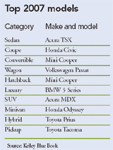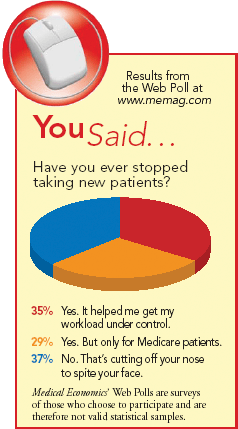Article
Update
Author(s):
Medicare reprieve; home remodeling; medical errors
REIMBURSEMENT
Medicare reprieve for doctors-and patients

CARS
Plan now to maximize your car's resale value

Aside from buying a car with a high resale value, you can protect your investment by choosing features that used car buyers will want down the road, such as antilock brakes, alloy wheels, CD player/changer, leather seats , and navigation system. You should also stick with a popular color, such as black, white, or silver.
HOME IMPROVEMENTS
Remodeling will cost you more, earn you less
The costs of home projects keep going up, but the value of the work is shrinking, says an annual survey conducted for Remodeling magazine. A major kitchen remodeling cost a national average of $54,241 in 2006, with an 80 percent return on resale. The same project cost an average of $43,862 in 2005 but earned back 91 percent of the costs. Midrange bathroom remodelings set homeowners back an average of $12,918 in 2006, with an 85 percent resale value, compared to $10,499, with a 102 percent return, in 2005.
MEDICAL ERRORS
Criminal actions or merely mistakes?
The Wisconsin Department of Justice recently filed criminal charges against a nurse who mistakenly administered an epidural intravenously, resulting in a patient's death. Now the Wisconsin Hospital Association warns that the DOJ's action could have a negative impact on the quality of care statewide because it sends a chilling message to healthcare providers in the state and those interested in practicing there. Moreover, the WHA contends that "mistakes will occur." It argues that because of the nature of healthcare delivery, the risk of a mistake "can be minimized" but not eliminated.
In a statement, the Institute for Safe Medication Practices supported the WHA's position: "Patient safety is better served by determining the system-based weaknesses that led to this error, sharing lessons learned with others, and taking action to prevent similar errors, rather than engaging in egregious criminal prosecution of a single individual."
CREDIT CARDS
Plastic, to control teens' spending?
A new prepaid MasterCard lets you dole out an allowance and set limits on where your kids can spend their money. The Allow Card ( http://www.allowcard.com), issued by South Dakota-based First Bank & Trust, includes 35 parental controls, including blocks on specific merchants. You'll also soon be able to keep your children from using the cards to get extra cash from an automated teller machine. But this peace of mind isn't cheap. You'll pay an activation fee of $19.95, $3.95 in shipping, and a monthly fee of $3.50 per account.
INVESTING
Don't count on your broker to save you money
Buying a load index fund through a broker will probably cost you three times as much in fees over time than if you bought a no-load version on your own, says a new study. Investors who buy equity index funds through a broker usually end up in load funds that carry higher operating charges, says the study from Zero Alpha Group, a network of independent investment advisory firms, and Fund Democracy, a mutual fund shareholder advocacy group. Assuming a 10 percent annual return, the average investor making a $10,000 investment, held over 20 years, would pay about $2,582 in expenses for a no-load equity index fund that doesn't charge 12b-1 fees, used to cover sales and marketing expenses. If the no-load does charge these fees, however, the investor's bill comes to $3,744. That amount more than doubles for load funds that carry 12b-1 fees, to a whopping $7,600.
HEALTH RECORDS
Patients are of two minds when it comes to access
Gaining access to their medical records across an electronic network makes most patients leery, according to a survey commissioned by the Markle Foundation. While nearly two-thirds of respondents said they'd like to be able to retrieve their medical records electronically-especially when changing doctors-four out of five people raised concerns about identity theft or fraud and feared that marketers could use their data without permission. If safeguards to protect their identity were in place, however, three out of four patients would be willing to share their personal information to help improve the quality of care and identify disease outbreaks.






